Church Organization
SEARCH BY TITLE
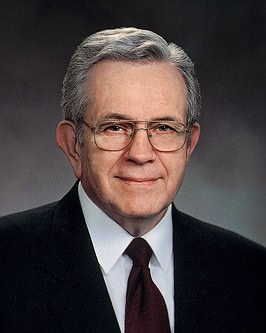 The Bishop and His Counselors
The Bishop and His Counselors
In all the world there is nothing quite like the office of bishop in The Church of Jesus Christ of Latter-day Saints. Except for parents, the bishop has the best opportunity to teach and to cause to be taught the things that matter most. And a bishop has the remarkable opportunity to teach parents about their responsibility; then he must allow them time to teach their children. The bishop is responsible for the young men of the Aaronic Priesthood and for the young women as well. He receives and accounts for tithes and offerings. He is responsible for the temporal affairs of the Church, to seek out the poor, and he has many other duties. The bishop is “to judge his people by the testimony of the just, and by the assistance of his counselors, according to the laws of the kingdom which are given by the prophets of God.” He is to judge them as to their worthiness to receive the ordinances and serve in offices. He is to counsel and correct and to preach the gospel to his flock, individually and collectively. In all of this, he is to teach the gospel of Jesus Christ, the Crucifixion, the Atonement, the Resurrection, the Restoration.
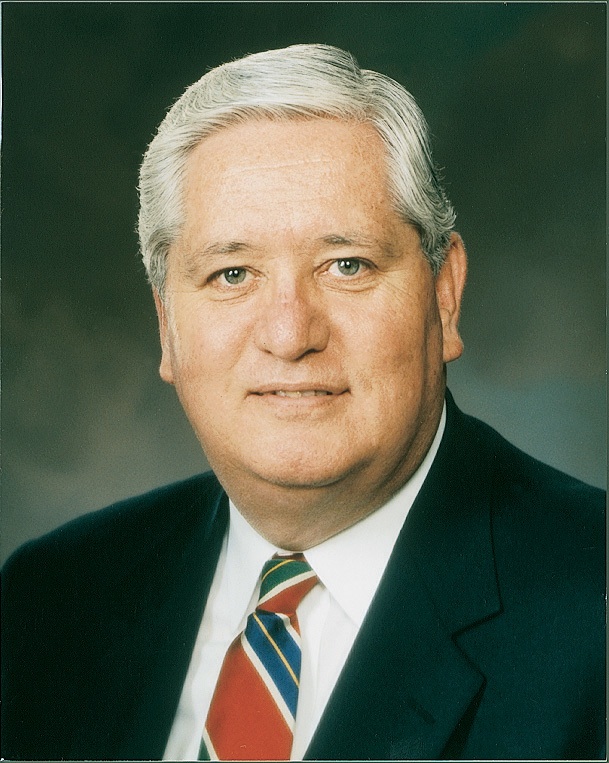 The Deacons Quorum
The Deacons Quorum
Young people have to be led to spiritual experiences at that age. The experiences are not just going to happen on their own. I remember my father taking me to witness a priesthood blessing of a less-active member. I couldn’t participate other than being there and feeling the Spirit, but my dad explained the ordinance and led me to that spiritual experience. . . There is nothing routine about passing the sacrament—when one is spiritually enlightened. If a deacon is taught in an inspiring way about the emblems of the bread and water and what they mean to him personally and to every person who presses those emblems to his or her lips, then the sacrament becomes a sacred experience every Sabbath day. But typically what I see with our Aaronic Priesthood holders is that they are more worried about which rows they are passing the sacrament to or whom they should pass to first on the stand. In this way, it can become routine to the point that it has lost its special character. If advisers will teach the administrative details well ahead of time, the details won’t become distractions.
 The Effective Elders Quorum
The Effective Elders Quorum
Build temporal self-reliance among quorum members. President J. Reuben Clark Jr. (1871–1961), First Counselor in the First Presidency, counseled that in dealing with the problems of needy individuals, the bishop’s responsibility is a temporary one and involves “caring for them until they can help themselves”; the priesthood quorum’s responsibility, however, continues “until not only [their] temporal needs are met, but [their] spiritual ones also. As a concrete example—a bishop extends help while the artisan or craftsman is out of work and in want; a priesthood quorum sets him up in work and tries to see that he goes along until fully self-supporting and active in his priesthood duties.” Build a viable home teaching system. Elder L. Tom Perry of the Quorum of the Twelve Apostles gave valuable counsel in the January 11, 2003, worldwide leadership training meeting. He spoke of small units in the Church. The counsel also fits when a home teaching base is small. Active home teachers should be assigned according to need, focusing first on new converts. Total coverage may not be achieved for some time. Elder Perry’s counsel was: “If, as priesthood leaders, you only help your members keep their covenants with the Lord, you have done measurably what you are expected to do.” Perhaps President Spencer W. Kimball (1895–1985) defined the essence of home teaching best when he stated: “The spirit of the times is worldliness. … But the Lord has offered an old program in new dress, and it gives promise to return the world to sane living, to true family life, to family interdependence. It is to return the father to his rightful place at the head of the family, to bring mother home from social life and employment, the children from near-total fun and frolic. The Home Teaching Program with its crowning activity, the Family Home Evening, will neutralize the ill effects if people will only apply the remedy.”
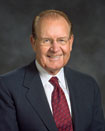 The High Priests Quorum
The High Priests Quorum
“The rights and responsibilities of high priests are to preside and to hold all the authority of elders. Brethren are ordained high priests when they are called to a stake presidency, high council, or bishopric or when otherwise determined by the stake president.” High priests should be worthy of great trust. Those who are ordained to this office in the priesthood should be men of faith, honesty, and integrity. They should be dependable and devoted to the Church so they can be depended upon to stand up for the gospel under all circumstances. One of the primary responsibilities of high priests is to serve as home teachers. As such they “represent the Lord, the bishop, and … group leaders. They support and serve all members of the families they visit. They nurture the friendship and respect of these members, showing genuine concern and love for them. … Home teachers are the Church’s first source of help to members. They consult with the head of the household about the family’s needs and the ways to be most helpful. They offer help when members are unemployed, ill, lonely, moving, or have other needs.”
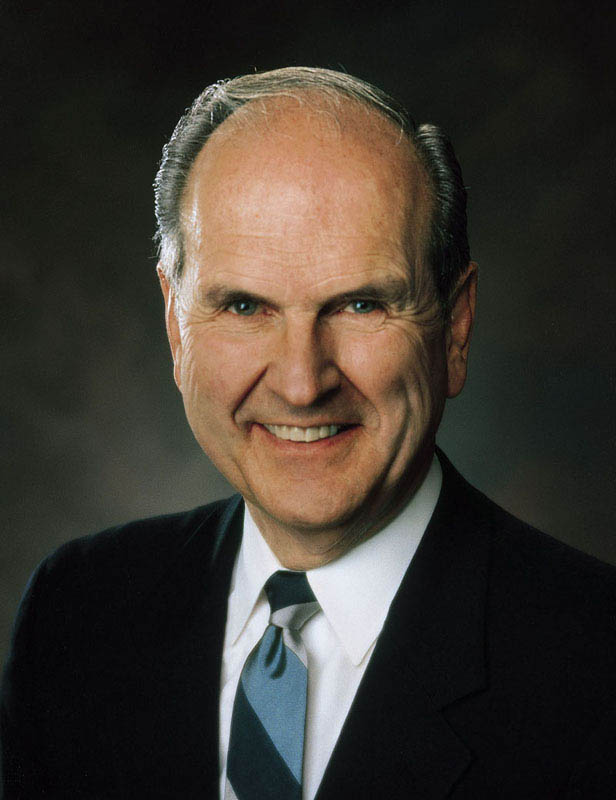 Honoring the Priesthood
Honoring the Priesthood
Differences exist in practice and organization between the Lord’s Church and man-made institutions. Men and women may form associations for and among themselves and be governed by stipulations that are mutually acceptable. The Church of Jesus Christ of Latter-day Saints, however, is neither a democracy nor a republic. His is a kingdom—the kingdom of God on earth. His is a hierarchical church, with ultimate authority at the top. The Lord directs His anointed servants. They testify to all the world that God has again spoken. The heavens have been opened. A living linkage has been formed between heaven and earth in our day. That supreme authority is supported by a firm foundation following an organizational pattern established anciently. Jesus Christ is the chief cornerstone, with Apostles and prophets and all the gifts, powers, and blessings that characterized the Church in earlier days.
 Keys of the Priesthood
Keys of the Priesthood
When hands are laid upon one’s head to be ordained or set apart, both the conveyor and the recipient of that priesthood authority bear obligations and accountability. Let me illustrate. Suppose you own keys to something of value in your life—a vehicle, a home, or a fine instrument. If you loan those keys to another with the intent that he or she use your property, you have certain obligations. You as the lender have a duty toward your borrower’s success. So you teach and train adequately to protect the user and, at the same time, safeguard your own valuable property. The receiver also has obligations. He or she must know applicable laws and obey them, take care of your property, and report back on how well he or she has used it. The same concepts apply to keys of the priesthood. Temple presidents, mission presidents, stake presidents, district presidents, bishops, branch presidents, and quorum presidents hold priesthood keys of presidency. Their keys control the power of their unit of the Church. That the mission of the Church be accomplished, those leaders not only call and release, but they also train and hold accountable those whom they call. Thus, members who receive priesthood ordinations or callings to serve in the Church have obligations of obedience and accountability. Every priesthood quorum has a president, whether it is a quorum of deacons, teachers, priests, elders, or high priests. Each president holds keys of authority. Quorum activities and opportunities for service are authorized by the president who holds those keys. Although a quorum president holds keys, his counselors do not. Auxiliary presidents do not hold keys. Counselors and auxiliary presidents serve on assignment from one holding keys who, in turn, has delegated authority for each of them to act. When one is released from his calling in the priesthood, if keys have been conferred, those keys are relinquished, to be given by proper authority to the new leader. When a bishop is released, for example, his priesthood ordination to the office of bishop remains, but his priesthood keys to serve as the bishop of the ward are conferred upon the new bishop.
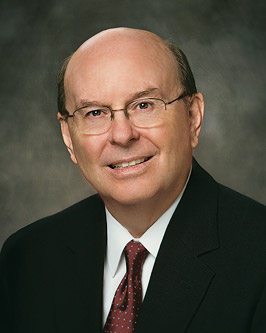 The Lord is My Light
The Lord is My Light
In addition to the family, the role of the Church is also significant. “The Church provides the organization and means for teaching the gospel of Jesus Christ to all of God’s children. It provides the priesthood authority to administer the ordinances of salvation and exaltation to all who are worthy and willing to accept them.” In the world there is rampant contention and iniquity and a major emphasis on divergent cultures and inequality. In the Church, except for language units, our wards and branches are geographical. We don’t divide by class or rank. We rejoice in the fact that all races and cultures are mixed together in a righteous congregation. Our ward family is important to our progress, happiness, and personal effort to be more Christlike. Cultures often divide people and are sometimes a source of violence and discrimination. In the Book of Mormon some of the most haunting language is used to describe the traditions of wicked fathers which led to violence, war, evil deeds, iniquity, and even the destruction of peoples and nations. There is no better starting point in the scriptures than 4 Nephi for a description of the Church culture that is essential for all of us. In verse 2 it reads in part, “The people were all converted unto the Lord, upon all the face of the land, both Nephites and Lamanites, and there were no contentions and disputations among them, and every man did deal justly one with another.” In verse 16 we read, “And surely there could not be a happier people among all the people who had been created by the hand of God.” The fact that there was no contention was attributed to “the love of God which did dwell in the hearts of the people.” This is the culture to which we aspire. Deep cultural values and beliefs go to the core of who we are. Traditions of sacrifice, gratitude, faith, and righteousness are to be cherished and preserved. Families must relish and protect traditions that build faith
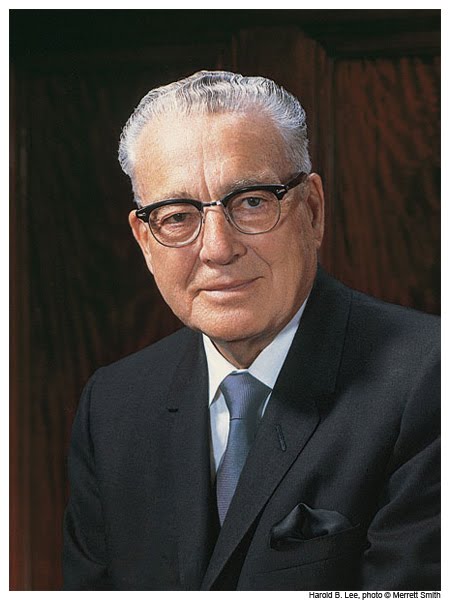 “May the Kingdom of God Go Forth”
“May the Kingdom of God Go Forth”
As I have participated with you in this moving experience of a solemn assembly, there has been brought more forcibly than ever to my mind the significance of the great revelation of the Lord given to the Church in 1835. In this revelation the Lord gave specific instructions setting forth the order of the priesthood in the government of the church and kingdom of God. In this revelation the Lord specified four requisites in the establishment of the First Presidency, or the presidency of the Melchizedek, or High, Priesthood of the Church, as the Lord speaks of it. (D&C 107:22.) First, it was requisite that there be three presiding high priests. Second, they were to be chosen by the body (which has been construed to be the Quorum of the Twelve Apostles). Third, they must be appointed and ordained by the same body—the Quorum of the Twelve. Fourth, they must be upheld by the confidence, faith, and prayers of the Church. All of these steps were taken in order that the quorum of the First Presidency could be formed to preside over the Church.
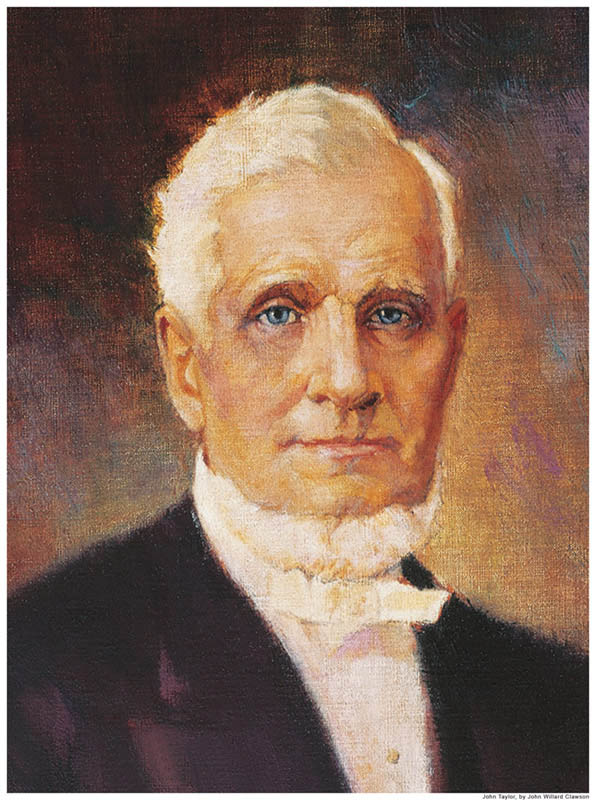 Organization of the First Presidency
Organization of the First Presidency
One duty devolving upon the Twelve is to see that the churches are organized correctly. And I think they are now thus organized throughout the land of Zion. The Churches generally are organized with Presidents of Stakes and their Counselors, with High Councils, with Bishops and their Counselors, and with the Lesser Priesthood, according to the order that is given us. Then we have the High Priests, Seventies and Elders occupying their places according to their Priesthood, position and standing in the Church. And the First Presidency seemed to be the only quorum that was deficient. And it is impossible for men acquainted with the order of the Holy Priesthood to ignore this quorum, as it is one of the principal councils of the Church. While the Twelve stand as a bulwark ready to protect, defend and maintain, to step forward and carry out the order of God’s Kingdom in times of necessity, such as the above referred to, yet when everything is adjusted and matters assume their normal condition, then it is proper that the Quorum of the First Presidency, as well as all other quorums, should occupy the place assigned it by the Almighty.
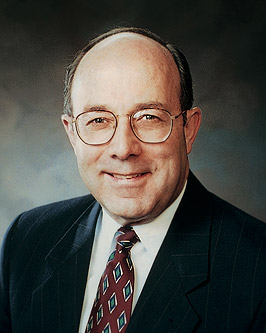 The Presiding Bishopric
The Presiding Bishopric
The Presiding Bishopric is also the channel through which temporal matters of the Church are carried out. These temporal matters include issues that deal with tithes; fast offerings; the recording, disbursement, and management of funds; and the welfare program of the Church and its humanitarian efforts. The Presiding Bishopric is also responsible for Church buildings; for membership records; for the production of temple clothing; and for the translating, printing, binding, and distributing of materials that are used in support of proclaiming and teaching the gospel. These materials include the scriptures, curriculum materials, posters, DVDs, videos, teaching aids, and the Church magazines—all in support of the spiritual purposes of the Church. All members of the Presiding Bishopric are General Authorities and as such can do whatever the First Presidency or Quorum of the Twelve Apostles asks of us. And so it was that I was on assignment to preside over a stake conference when this question came to me. In most people’s minds, the temporal affairs for which the Presiding Bishopric is responsible are the business aspects of the Church. But in the 29th section of the Doctrine and Covenants, the Lord says, “Wherefore, verily I say unto you that all things unto me are spiritual, and not at any time have I given unto you a law which was temporal; … for my commandments are spiritual”.
 The Priests Quorum
The Priests Quorum
We underestimate and therefore underutilize priests. For example, priests are empowered to confer the Aaronic Priesthood and ordain deacons, teachers, and priests, but they seldom are given a chance to do so. The same thing is true of performing baptisms. Priests also have the duty to “preach, teach, expound, exhort”. But how much of our thinking goes to helping priests preach or teach or expound? These young men seldom have the opportunity to stand in the stature of their priesthood in full measure. But if you give a group of priests a chance to stand up and really start to do some significant things, they immediately respond. They are hungry for an invitation to do much more. Translating the revealed duties of a priest into the arena of a 16-year-old is a challenge and a great opportunity. . . I believe that priesthood leaders should be focusing priests on missions—letting them know what is required and helping them get prepared. They should be focusing them on temple preparations—preparing priests for the covenants they are going to make as they go on their missions—and also on receiving the Melchizedek Priesthood. The Aaronic Priesthood is a preparatory priesthood leading up to this. If a young man is really focused on these goals, he will be more likely to resist temptation. Many young men keep certain commandments because they want to be missionaries. If I were a quorum leader, I would try to get my priests to interact with returned missionaries and missionaries serving in my area.
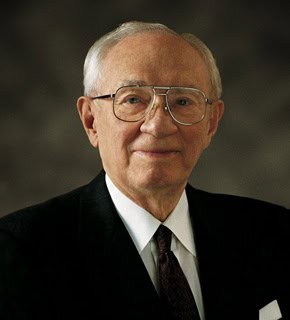 The Quorum of the First Presidency
The Quorum of the First Presidency
The place of the President of the Church and that of the Quorum of the First Presidency in having responsibility for the entire Church in all the world is clearly set forth in these revelations recorded in the Doctrine and Covenants. At the same time, the Quorum of the Twelve Apostles is spoken of as being “equal in authority and power to the three presidents previously mentioned” The Seventy, likewise, “form a quorum, equal in authority to that of the Twelve special witnesses or Apostles just named”. The question arises, How can they be equal in authority? Speaking to this question, President Joseph F. Smith (1838–1918) taught: “I want here to correct an impression that has grown up to some extent among the people, and that is, that the Twelve Apostles possess equal authority with the First Presidency in the Church. This is correct when there is no other Presidency but the Twelve Apostles; but so long as there are three presiding Elders who possess the presiding authority in the Church, the authority of the Twelve Apostles is not equal to theirs. If it were so, there would be two equal authorities and two equal quorums in the Priesthood, running parallel, and that could not be, because there must be a head”.
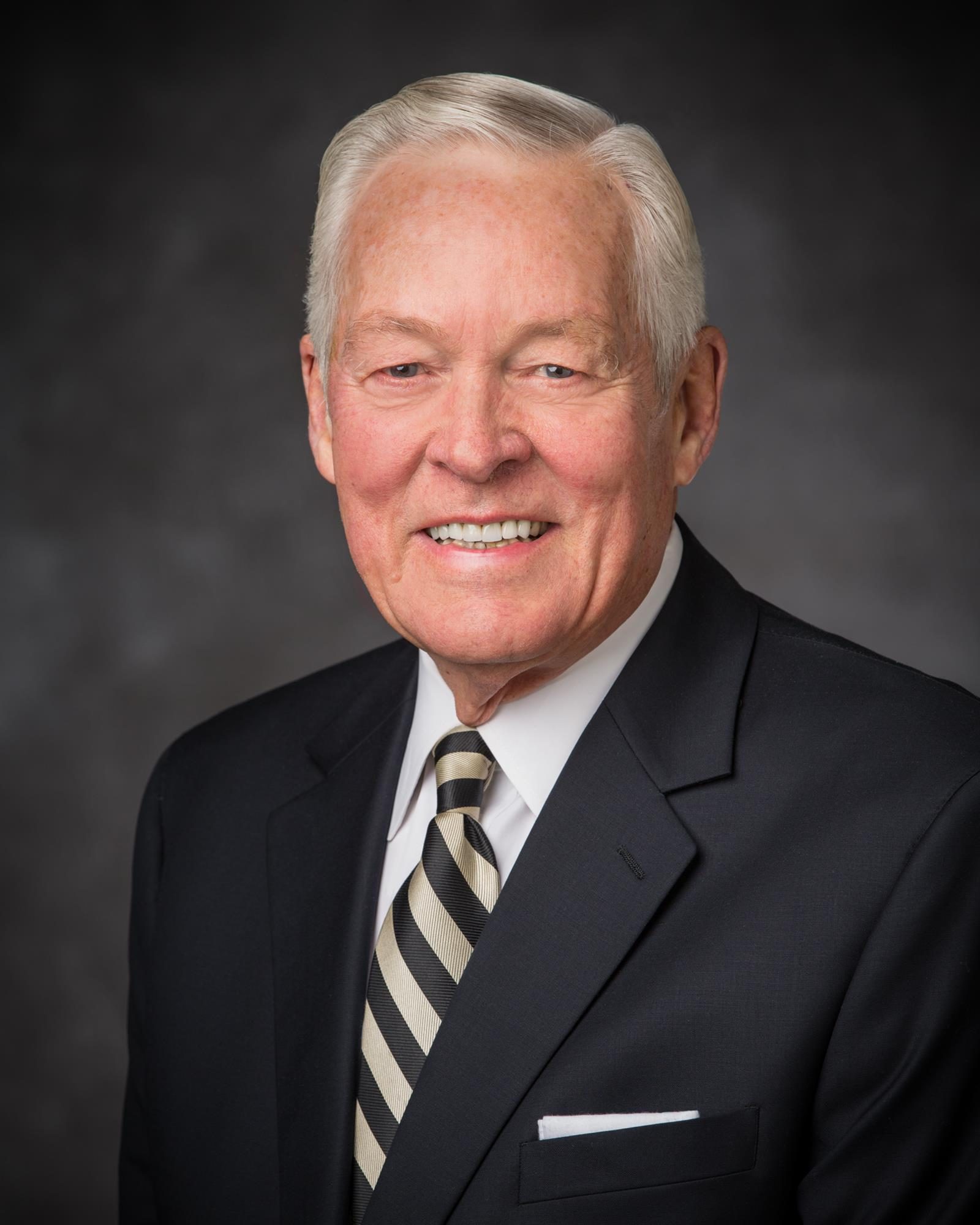 The Quorum of the Seventy
The Quorum of the Seventy
Latter-day revelations provide that the Seventy are “to preach the gospel, and to be especial witnesses [of Jesus Christ] … in all the world”. Furthermore, they “are to act in the name of the Lord, under the direction of the Twelve … in building up the church and regulating all the affairs of the same in all nations” The unique and singular calling of the Seventy is clearly established in the revelations: “It is the duty of the [Twelve] to call upon the Seventy, when they need assistance, to fill the several calls for preaching and administering the gospel, instead of any others”. The Seventy do not receive additional priesthood keys, but with each assignment they receive from the First Presidency or the Quorum of the Twelve Apostles, they are delegated authority to accomplish the assignment given. The General Authority Seventies meet in regular quorum meetings. Those assigned at Church headquarters meet weekly. These quorum meetings may consist of doctrinal and Church history instruction and training and, from time to time, counsel from the Twelve Apostles and the Presidency of the Seventy.
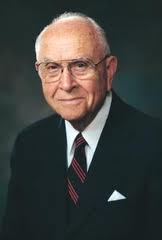 Solemn Assemblies
Solemn Assemblies
A solemn assembly, as the name implies, denotes a sacred, sober, and reverent occasion when the Saints assemble under the direction of the First Presidency. Solemn assemblies are used for three purposes: the dedication of temples, special instruction to priesthood leaders, and sustaining a new President of the Church. This conference session today is a solemn assembly for the purpose of sustaining a newly called Church President and other officers of the Church. There is a pattern to solemn assemblies that distinguishes them from other general Church meetings where we sustain officers of the Church. That pattern, which was established by the Prophet Joseph Smith, is that the priesthood quorums, commencing with the First Presidency, stand and manifest by the uplifted right hand their willingness to sustain the President of the Church as a prophet, seer, and revelator, and uphold him by their confidence, faith, and prayers. The priesthood quorums of the Church so manifest by their vote. Then the general body of all the Saints stand and signify their willingness to do the same. The other leaders of the Church are similarly sustained in their offices and callings. When we sustain the President of the Church by our uplifted hand, it not only signifies that we acknowledge before God that he is the rightful possessor of all the priesthood keys; it also means that we covenant with God that we will abide by the direction and the counsel that come through His prophet. It is a solemn covenant.
 The Teachers Quorum
The Teachers Quorum
Our young people need the opportunity to feel the Spirit in a Church setting. Imagine what it means to have a young man kneel with his peers around a classroom table, or whatever the forum is, in humble prayer. This practice can make a big difference in the lives of young men. . . Think what it does if they kneel in prayer for another quorum member who is sick or has gone astray or is having a problem. It starts to build the brotherhood these boys ought to be feeling. At these young men’s age, so often their friends are most influential in their lives. We would like them to have friends in the quorum with whom they have spiritual experiences, with whom they share support, and with whom they develop a real brotherhood. . . It’s one thing to have a quorum adviser call to inquire about a quorum member’s welfare. It’s quite another to have his quorum president visit or call.
 This is the Work of the Master
This is the Work of the Master
With President Hunter’s passing, the First Presidency was dissolved. Brother Monson and I, who had served as his counselors, took our places in the Quorum of the Twelve, which became the presiding authority of the Church. Three weeks ago today all of the living ordained Apostles gathered in a spirit of fasting and prayer in the upper room of the temple. Here we sang a sacred hymn and prayed together. We partook of the sacrament of the Lord’s supper, renewing in that sacred, symbolic testament our covenants and our relationship with Him who is our divine Redeemer. The presidency was then reorganized, following a precedent well established through generations of the past. There was no campaigning, no contest, no ambition for office. It was quiet, peaceful, simple, and sacred. It was done after the pattern which the Lord Himself had put in place. We have received from many people expressions of congratulations and confidence. These have come from members of the Church and from those not of our faith. To one and all I express my deep appreciation. I know full well that it is not the man whom they compliment, but, rather, the office. Yesterday morning members of the Church across the world met together in a solemn assembly. You raised your hands, without compulsion and of your own free will, to confirm the action taken by the Apostles three weeks ago and to sustain those called to serve.
 “Thus Shall My Church Be Called”
“Thus Shall My Church Be Called”
“Thus shall my church be called in the last days, even The Church of Jesus Christ of Latter-day Saints.” Note carefully the language of the Lord. He did not say, “Thus shall my church be named.” He said, “Thus shall my church be called.” Years ago, its members were cautioned by the Brethren who wrote: “We feel that some may be misled by the too frequent use of the term ‘Mormon Church.’” (Member-Missionary Class—Instructor’s Guide, Salt Lake City: The Church of Jesus Christ of Latter-day Saints, 1982, p. 2.) Before any other name is considered to be a legitimate substitute, the thoughtful person might reverently consider the feelings of the Heavenly Parent who bestowed that name. . . The first two words of the name the Lord chose for His earthly organization are The Church. Note that the article The begins with a capital letter. This is an important part of the title, for the Church is the official organization of baptized believers who have taken upon themselves the name of Christ. The foundation of the Church is the reality that God is our Father and that His Only Begotten Son, Jesus Christ, is the Savior of the world. The witness and inspiration of the Holy Ghost confirm those realities. The Church is the way by which the Master accomplishes His work and bestows His glory. Its ordinances and related covenants are the crowning rewards of our membership. While many organizations can offer fellowship and fine instruction, only His church can provide baptism, confirmation, ordination, the sacrament, patriarchal blessings, and the ordinances of the temple—all bestowed by authorized priesthood power. That power is destined to bless all children of our Heavenly Father, regardless of their nationality: “The keys of the kingdom of God are committed unto man on the earth, and from thence shall the gospel roll forth unto the ends of the earth.”
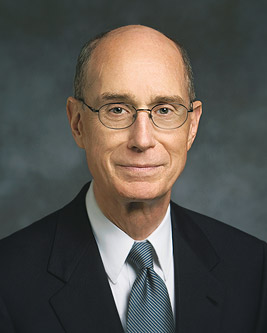 The True and Living Church
The True and Living Church
This is the true Church, the only true Church, because in it are the keys of the priesthood. Only in this Church has the Lord lodged the power to seal on earth and to seal in heaven as He did in the time of the Apostle Peter. Those keys were restored to Joseph Smith, who then was authorized to confer them upon the members of the Quorum of the Twelve. When the Prophet Joseph was murdered, the enemies of the Church thought that the Church would die. They thought it was the creation of a mortal man and therefore would perish with him. But their hopes were dashed. It was the true Church, and it also had the power to live on, even when those chosen for a time to lead it died. We have seen today a demonstration that this is the true and living Church. The keys of the priesthood are held by mortals, but the way has been prepared by the Lord for the keys to remain functioning on the earth so long as the people exercise faith both that the keys are on the earth and that they have been passed on by the will of God to His chosen servants.
 The Twelve Apostles
The Twelve Apostles
The First Presidency was in place by 1833; then two years later, in February of 1835, came the Quorum of the Twelve Apostles. And that is as it should be. The First Presidency came first in sequence and stands first in authority. And, true to the pattern, it was made of men called from the ordinary pursuits of life. With the First Presidency and the Quorum of the Twelve in place, with the offices of the Seventy and the Presiding Bishopric revealed, the proper order of things prevails. But there is a difference. Perhaps President J. Reuben Clark said it best: “Some of the General Authorities [the Apostles] have had assigned to them a special calling; they possess a special gift; they are sustained as prophets, seers, and revelators, which gives them a special spiritual endowment in connection with their teaching of the people. They have the right, the power, and authority to declare the mind and will of God to his people, subject to the over-all power and authority of the President of the Church. Others of the General Authorities are not given this special spiritual endowment.” The resulting limitation “applies to every other officer and member of the Church, for none of them is spiritually endowed as a prophet, seer, and revelator.” Furthermore, President Clark said that among those of the Twelve and the Presidency, “only the President of the Church, the Presiding High Priest, is sustained as Prophet, Seer, and Revelator for the Church, and he alone has the right to receive revelations for the Church, either new or amendatory, or to give authoritative interpretations of scriptures that shall be binding on the Church, or change in any way the existing doctrines of the Church.” It took a generation of asking and receiving before the order of things as we know it today was firmly in place. Each move to perfect that order has come about in response to a need and in answer to prayer. And that process continues in our day.
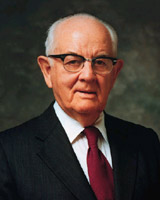 “We Thank Thee, O God, for a Prophet”
“We Thank Thee, O God, for a Prophet”
The calling of President Harold B. Lee follows the same pattern as that of the other Presidents back for many, many years. He holds all the same keys, has the same authority, represents the same church except that it has grown much larger. When the Church was organized in 1830 it was composed of six people. So the Prophet Joseph Smith presided at first over a very small group, but it grew to many thousands by the time of his martyrdom. . . and as President Harold B. Lee becomes the President, there are about 3,200,000 and growing very rapidly. It is reassuring to know that President Lee was not elected through committees and conventions with all their conflicts, criticisms, and by the vote of men, but was called of God and then sustained by the people. . . The Quorum of the Twelve on July 7, 1972, held all these gifts. And President Harold B. Lee has held them and the keys and the fullness of the priesthood since April 10, 1941, reaffirmed by the Quorum of the Twelve Apostles on July 7 of this year. Full provision has been made by our Lord for changes. Today there are fourteen apostles holding the keys in suspension, the twelve and the two counselors to the President, to be brought into use if and when circumstances allow, all ordained to leadership in their turn as they move forward in seniority. There have been some eighty apostles so endowed since Joseph Smith, though only eleven have occupied the place of the President of the Church, death having intervened; and since the death of his servants is in the power and control of the Lord, he permits to come to the first place only the one who is destined to take that leadership. Death and life become the controlling factors. Each new apostle in turn is chosen by the Lord and revealed to the then living prophet who ordains him. The matter of seniority is basic in the first quorums of the Church. All the apostles understand this perfectly, and all well-trained members of the Church are conversant with this perfect succession program.
